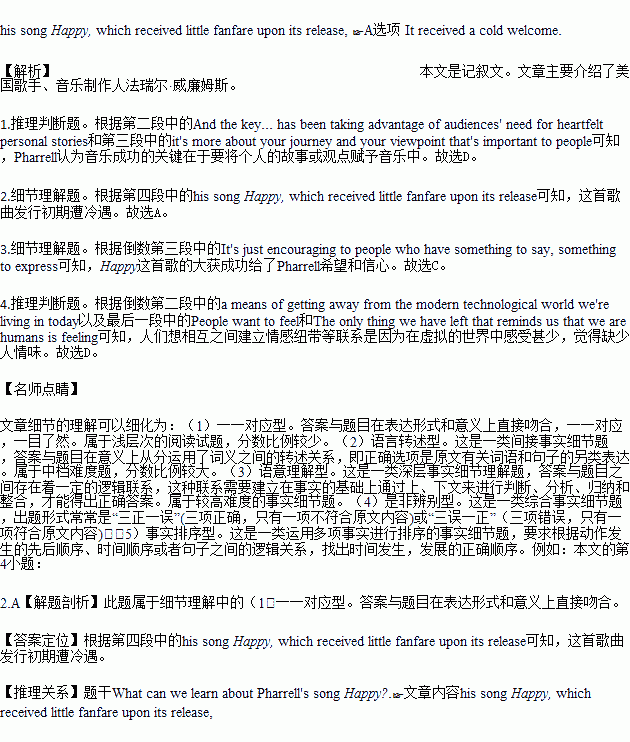题目内容
Pharrell Williams takes a breath and considers how the past years have developed for him: ten Grammy Awards and a number of hit singles including a song that has caused countless fans to express how they are “happy”.
And the key, says the 43?year?old known simply as Pharrell, has been taking advantage of audiences' (听众的) need for heartfelt personal stories.
“I think we've entered a new singer?songwriter time,” said the American singer and producer. “People want a story. They want a story they can connect to. It's not about what you have or what you don't have; it's more about your journey and your viewpoint that's important to people.”
Pharrell said he noticed a change in audiences' tastes over the past year in particular with the sudden success of his song Happy, which received little fanfare upon its release but has turned into an international hit. Countless videos populate sites like YouTube with people from Portugal and China to Abu Dhabi and Iran singing and dancing along to the song.
After seeing how far his song traveled, the singer broke down in tears during a televised interview with the famous talk show host Oprah Winfrey.
“It's just encouraging to people who have something to say, something to express,” he said.
The success has made Pharrell realize that people are searching for personal and emotional links (情感纽带), perhaps as a means of getting away from the modern technological world we're living in today.
“People want to feel. There's too much thinking to deal with,” the singer said. “We're different from what we were 15 years ago, The only thing we have left that reminds (提醒) us that we are humans is feeling. It' s the most important thing ever.”
1.What's the key to successful music according to Pharrell?
A. Writing happy songs.
B. Following your heart.
C. Telling moving stories.
D. Sharing personal experiences.
2.What can we learn about Pharrell's song Happy?
A. It received a cold welcome.
B. It became popular overnight.
C. It changed audiences' tastes in music.
D. It received different responses at home and abroad.
3.How did Pharrell feel about the success of his song?
A. It was caused by good luck.
B. It was within his expectations.
C. It gave him hope and confidence.
D. It prevented him giving up making music.
4.Why do people want to be connected to others emotionally?
A. They need someone to talk to.
B. They need others to help them think.
C. They are tired of their own personal life.
D. They feel less human in the technological world.
 阅读快车系列答案
阅读快车系列答案
